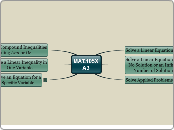MAT.105X
A3
Solve an Equation for a Specific Variable
Treat all variables you are not solving for as constants.
Solve a Linear Inequality in One Variable
Compound Inequality
Three parts: all operations must be performed on each of the three parts
Solutions
Write in inequality notation
Graph on a number line
Write in set notation
Write in interval notation
The process is mostly the same as for solving linear equations in one variable. However,
when we multiply or divide both sides of the inequality by a negative number we must reverse the direction of the inequality symbol.
Linear Inequality in One Variable
A linear inequality in one variable can be written in the form
ax+b<c,
ax+b<=c,
ax+b>c, or
ax+b>=c,
where a, b, and c are real numbers and a is not zero.
Solve Compound Inequalities Containing And or Or
Or / Union
Take everything (but only take things that overlap once)
And / Intersection
Take the overlap
Solve Applied Problems
Simple Interest
I=PRT
I=interest earned (simple)
P=principal (initial amount invested)
R=annual interest rate (expressed as a decimal)
T=amount of time the money is invested (in years)
Read the problem carefully. Then read it again. Draw a picture, if applicable.
Identify what you are being asked to find. Define the variable; that is, assign a variable to the unknown quantity. Also,
If there are other unknown quantities, define them in terms of the variable.Label the picture with the variable and other unknowns as well as with any given information in the problem.Translate from English to math. Some suggestions for doing so are
Restate the problem in your own words.Read and think of the problem in "small parts."Make a chart to separate these "small parts" of the problem to help you translate to mathematical terms.Write an equation in English, then translate it to an algebraic expression.Solve the equation.
Interpret the meaning of the solution as it relates to the problem. If there are other unknowns, find them. State the answer in a complete sentence. Be sure your answer makes sense in the context of the problem.
Solve a Linear Equation with No Solution or an Infinite Number of Solutions
Infinite Number of Solutions
An equation has an infinite number of solutions if an identity results from the solution process.
We say the solution set is the set all real numbers.
No Solution
An equation has no solution if a contradiction results from the solution process.
We say the solution set is the empty set.
Solve a Linear Equation
Linear Equation
A linear equation in one variable is an equation that can be written in the form ax+b=0 where a and b are real number and a is not zero.
Process
If there are terms in parentheses, begin by distributing.Combine like terms on each side of the equal sign.Get the terms with the variables on one side of the equal sign and the constants on the other side using the addition and subtraction properties of equality.Solve for the variable using the multiplication or division property of equality.Check the solution in the original equation.Equation
An equation is a mathematical statement that two expressions are equal.
We can solve equations.
We can simplify expressions. Expressions do not contain an equal sign (=).
Properties
Let a, b, and c be real numbers.
If a=b, then a+c=b+c and a-c=b-c.If a=b and c is not zero, then ac=bc and a/c=b/c.Solve an Equation
To solve an equation means to find the value or values of the variable that make the equation true.









